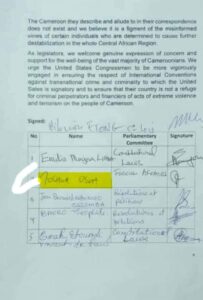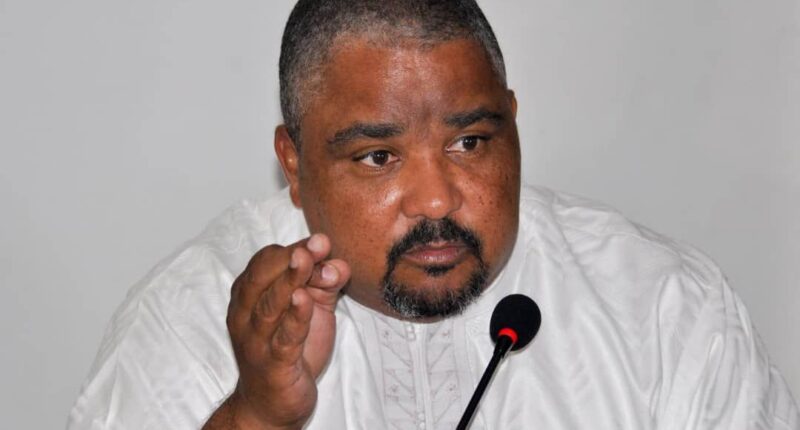Joshua Osih’s Controversial 2021 Letter: A Betrayal of Southern Cameroons?
Yaoundé, Cameroon – August 8, 2025
In 2021, a letter signed by 62 Cameroonian Members of Parliament, including 61 from the ruling Cameroon People’s Democratic Movement (CPDM) and one opposition figure, sparked outrage among Southern Cameroonians. The letter, addressed to the United States Congress, urged the U.S. government to persecute and repatriate suspected sympathizers of the Southern Cameroons cause—commonly referred to as the Anglophone conflict—seeking refuge in the U.S. The lone opposition parliamentarian among the signatories was none other than Joshua Osih, the Social Democratic Front (SDF) National Chairman and a prominent Anglophone politician. As Osih campaigns for the 2025 presidential elections, this act continues to cast a long shadow over his credibility, raising serious questions about whether Southern Cameroonians can trust him to represent their interests.
The Infamous Letter and Its Implications
The 2021 letter was a direct response to U.S. senators who criticized Cameroon’s government for its violent military response to protests in the Northwest and Southwest regions, where the Anglophone conflict has claimed over 6,500 lives and displaced more than 584,000 people since 2017. The U.S. lawmakers called for a reconsideration of repatriating Cameroonians, particularly Anglophones, due to the ongoing human rights abuses in the region. The Cameroonian MPs’ letter, however, dismissed these concerns, accusing the U.S. of interfering in Cameroon’s sovereignty and defending the government’s actions.
Osih’s decision to sign the letter alongside CPDM parliamentarians stunned many in the SDF and the broader Anglophone community. As an Anglophone from the Southwest region and a senior SDF leader, Osih was expected to champion the cause of his people, who have faced marginalization, military repression, and separatist violence. Instead, his signature aligned him with a regime widely criticized for its heavy-handed approach to the crisis, including unlawful killings, sexual violence, and village burnings documented by organizations like Amnesty International.

An anonymous SDF parliamentarian at the time expressed dismay, stating, “Osih has clearly demonstrated his greed and dishonesty by siding with the ruling party’s members of parliament who have never wanted the Southern Cameroons issue to be discussed in parliament”. The SDF’s National Executive Committee (NEC) demanded that Osih either withdraw his signature or push for a parliamentary debate on the Anglophone crisis. He refused, further deepening the rift with his party and constituents.
A History of Controversy
Osih’s political career has been marked by both promise and polarization. As the first Anglophone to serve as a parliamentarian in Douala and the SDF’s 2018 presidential candidate, he was once seen as a beacon of hope for a younger, more dynamic opposition. His bilingual background and business acumen were touted as strengths to bridge Cameroon’s Francophone-Anglophone divide. However, his actions in 2021 have led many to question his commitment to the Anglophone cause.
Critics argue that Osih’s alignment with the CPDM on the letter was a calculated move to curry favor with the ruling party, possibly to bolster his political ambitions. “Osih wants to be the president of Cameroon, but how can he win in the English-speaking regions when he has disrespected the suffering people of Southern Cameroons?” an SDF MP remarked in 2021. The Anglophone regions, the SDF’s traditional stronghold, have been devastated by the conflict, with schools closed, affecting 250,000 children, and widespread humanitarian needs. Osih’s refusal to retract his signature or engage in meaningful dialogue on the crisis has fueled accusations of opportunism.
Can Southern Cameroonians Trust Osih?
As Osih campaigns for the 2025 presidential elections, the 2021 letter remains a lightning rod for criticism. Acha Eric, a Southern Cameroonian activist, recently called for the letter to be reprinted and distributed across constituencies in the Northwest and Southwest regions to remind voters of Osih’s stance. “Our people are not short-sighted. They haven’t forgotten that quick, and they are definitely not going to forget,” Eric wrote, urging communities to confront Osih with his “shady manifesto” during campaign stops.
Public sentiment in the Anglophone regions is deeply skeptical. The SDF, once a powerful voice for federalism and Anglophone rights, has lost significant ground, holding only five seats in the 180-seat parliament compared to 18 previously. Osih’s decision to run as the SDF candidate without a party convention to formalize his nomination has further alienated supporters, who see it as a disregard for democratic processes within the party. His reluctance to join an opposition coalition, despite calls for unity to challenge President Paul Biya’s 43-year rule, has also drawn criticism. Osih’s assertion that coalition talks are “premature” and his focus on labor unions over broader opposition alliances suggest a go-it-alone strategy that many view as benefiting the CPDM.
Moreover, Osih’s handling of the Anglophone crisis has been inconsistent. While he has publicly acknowledged the need for dialogue and criticized Biya’s reliance on military force, his actions—such as signing the 2021 letter—undermine his rhetoric. The Anglophone community, battered by both government and separatist violence, demands leaders who unequivocally advocate for their rights, whether through federalism or greater autonomy. Osih’s moderate stance, while appealing to some, is seen by others as a betrayal of the radical change needed to address decades of marginalization.
A Path Forward?
For Osih to regain trust, he must confront the 2021 letter head-on. A public apology, coupled with a clear plan to address the Anglophone crisis—such as advocating for federalism or inclusive dialogue—could begin to mend ties with his base. His recent European tour, where he discussed federalism and the Anglophone crisis, indicates an attempt to reconnect with the diaspora, but questions remain about why these issues are not being addressed more forcefully in Cameroon.
The broader challenge for Southern Cameroonians is navigating a political landscape where trust is scarce. The CPDM’s dominance, the opposition’s fragmentation, and the ongoing violence in the Anglophone regions create a complex environment for any leader. Osih’s business background and bilingualism could be assets in uniting a divided nation, but his past decisions have eroded confidence. As one observer noted, “If Osih wants to lead, he must show he stands with the people, not against them”.
As the 2025 elections approach, Southern Cameroonians will likely judge Osih not by his promises but by his actions. The 2021 letter remains a stark reminder of a choice that many in the Anglophone regions view as a betrayal. Whether Osih can overcome this stain on his record will depend on his ability to demonstrate genuine commitment to their cause. For now, the question lingers: can Southern Cameroonians trust Joshua Osih?





